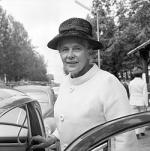Disable ads!
Alva Myrdal
This article may be expanded with text translated from the corresponding article in the Swedish Wikipedia. (November 2012) Click on the right to read important instructions before translating. View a machine-translated version of the Swedish article. Google's machine translation is a useful starting point for translations, but translators must revise errors as necessary and confirm that the translation is accurate, rather than simply copy-pasting machine-translated text into the English Wikipedia. Do not translate text that appears unreliable or low-quality. If possible, verify the text with references provided in the foreign-language article. After translating, {{Translated|sv|Alva Myrdal}} must be added to the talk page to ensure copyright compliance. For more guidance, see Wikipedia:Translation. Alva Myrdal in Tierp 1966. Alva Myrdal (Swedish: [ˌalːva ˈmyːɖɑːl]; née Reimer; 31 January 1902 – 1 February 1986) was a Swedish sociologist and politician. She received the Nobel Peace Prize in 1982. She married Gunnar Myrdal in 1924. Born in Uppsala, she first came to public notice in the 1930s, and was one of the main driving forces in the creation of the Swedish welfare state. She coauthored the book Crisis in the Population Question (Swedish: Kris i befolkningsfrågan with Gunnar Myrdal in 1934). The basic premise of Crisis in the Population Question is to find what social reforms are needed to allow for individual liberty (especially for women) while also promoting child-bearing, and encouraging Swedes to have children. While heralding many sweeping social reforms seen as positive for Sweden, the book also incorporated some of the zeitgeist of the 1930s, in its promotion of the idea of racism, eugenics and compulsory sterilization programs.[citation needed] With architect Sven Markelius she designed Stockholm's cooperative Collective House in 1937 with an eye towards developing more domestic liberty for women. A long-time prominent member of the Swedish Social Democratic Party, in the late 1940s she became involved in international issues with the United Nations, appointed to head its section on welfare policy in 1949. From 1950 to 1955 she was chairman of UNESCO's social science section—the first woman to hold such prominent positions in the UN. In 1955-1956 she served as a Swedish envoy to New Delhi, India, Rangoon, Burma (Myanmar) and Colombo, Ceylon (Sri Lanka). In 1962 Myrdal was elected to the Swedish parliament, and in 1962 she was sent as the Swedish delegate to the UN disarmament conference in Geneva, a role she kept until 1973. She participated in the creation of the Stockholm International Peace Research Institute, becoming the first Chairman of the governing board in 1966. In 1966 she was also named consultative Cabinet minister for disarmament, an office she held until 1973. A vocal supporter of disarmament, Myrdal received the Nobel Peace Prize in 1982 together with Alfonso Garcia Robles. In 1983 Myrdal effectively ended the heated controversy over the future of Adolf Fredrik's Music School, "The AF-fight" (Swedish: AF-striden). She is the mother of Jan Myrdal, Sissela Bok and Kaj Fölster.
 Read more on wikipedia.org Read more on wikipedia.org
 All quotes by Alva Myrdal All quotes by Alva Myrdal
 Edit Edit
|

|
|
|
|
|
Background photo by Giuliana
|